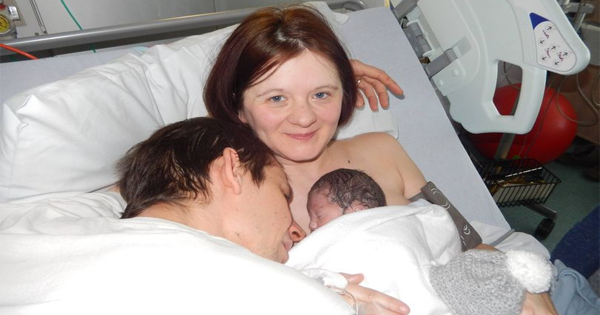Samantha and Dennis Kerr have been hoping to have kids for quite some time now. The couple experienced two miscarriages in the past, so when they learned that Samantha was pregnant with a son, Gabriel, they couldn’t be more thrilled.
At her six-week ultrasound, both mother and father-to-be stared avidly at the screen, watching their son’s heart beat steadily.
The next couple weeks, Samantha’s pregnancy progressed normally.
But at her 12-week scan, there was something unusual about her son’s heartbeat that she hadn’t noticed before. She knew, even before the sonographer said it, “It’s not good news.”
“I could see where the heart was,” Samantha recalled.
The doctor diagnosed Gabriel with ectopia cordis, a rare congenital malformation that causes the heart to only partially form or form outside of the baby’s chest. In Gabriel’s case, his heart had formed outside of his body. If he was born like this, there was no chance he would survive.
The Kerrs were referred to a more specialized hospital, St Thomas’ Hospital, in London, where they were presented options of how they could proceed.
“They suggested we terminate the pregnancy as Gabriel might not make it to term,” Samantha explained. But that had never been an option for her nor Dennis.
“Me being me, we couldn’t just make that decision. We wanted to see what happened,” she elaborated. “We just wanted to see what could be done for him.”
The Kerrs met with their new doctors several more times, but there was little else that could be done for Gabriel aside from providing him comfort care.
“There would be no resuscitation, no oxygen given. It was incredibly difficult to hear that,” Samantha remembered.
One thing she and Dennis did fight for, however, was to be able to deliver Gabriel via C-section. They felt it would give him a better chance of being delivered alive and having at least a short period of time with them before he passed.
Now, looking back, Samantha knew she’d fought the right battle. “I am grateful for the cesarean, as I believe it gave us those four hours with him.”
In March 2015, Gabriel was delivered. “He came out, and he cried,” Samantha remembered fondly. “We wanted that so much. We had prayed for that.
“He was just too perfect for this world. We could see his heart beating, and while you don’t want to see that because it obviously meant he was poorly, he was just the most incredible, special little boy.”

Immediately after Gabriel’s birth, doctors gave the family their own, private room where they could spend time with their newborn son before he passed away.
Extended family also came in to see the boy, like Samantha’s mother, who even got a chance to change her grandson’s diaper.
After four hours, and just one moment to open his eyes, Gabriel passed away in his parents’ arms.
But what happened after was something the Kerrs hadn’t anticipated at all. The doctors asked if the parents would like the chance to bring their son home, just for a few days, to bond with him before they had to say goodbye.
Doctors could provide the Kerrs with cold packs that they could keep against Gabriel’s body to keep it preserved during his time at the house.
The answer was obvious: Yes.
For the next three days, family and friends went over to the Kerrs’ home with clothes, supplies, and anything else the family might need to make believe that they were taking care of newborn Gabriel, as they would any other baby.
"It was hard at night, though, with him in the room with us. We were half expecting Gabriel to cry, or need changing or feeding,” Samantha explained.
“In the time we spent with [Gabriel], he never lost his baby smell,” Samantha said.
When time came for the family to say goodbye, grief was still aplenty, but they were able to at least deal with their grief all together, as a family. “It was family who we leaned on mostly,” Samantha explained.
Some people are questioning their choice to bring home their child’s dead body, but Samantha defended her decision. “"It's an individual choice. A parent will know in their heart of hearts whether it's right and if they're not coping it may be too hard. If you feel you can do it, do it.
"But we'd had time to prepare, and I will never take those three days back."





